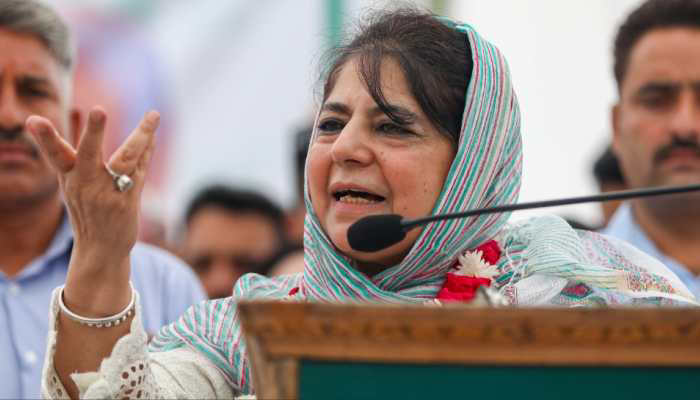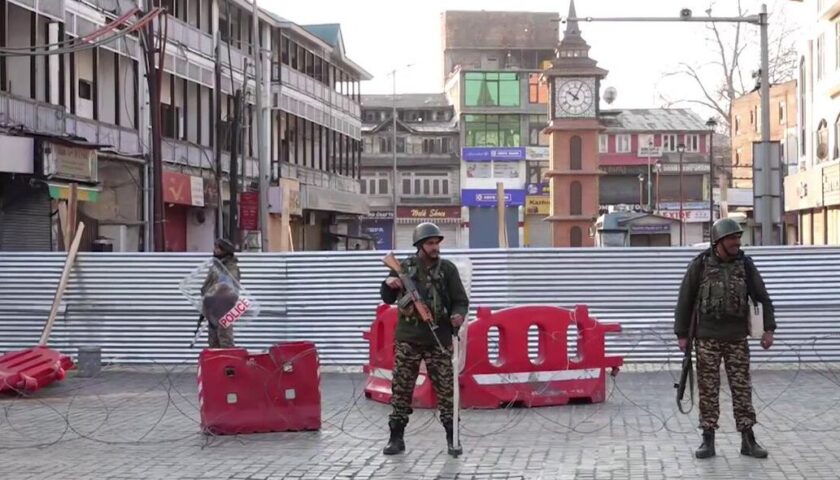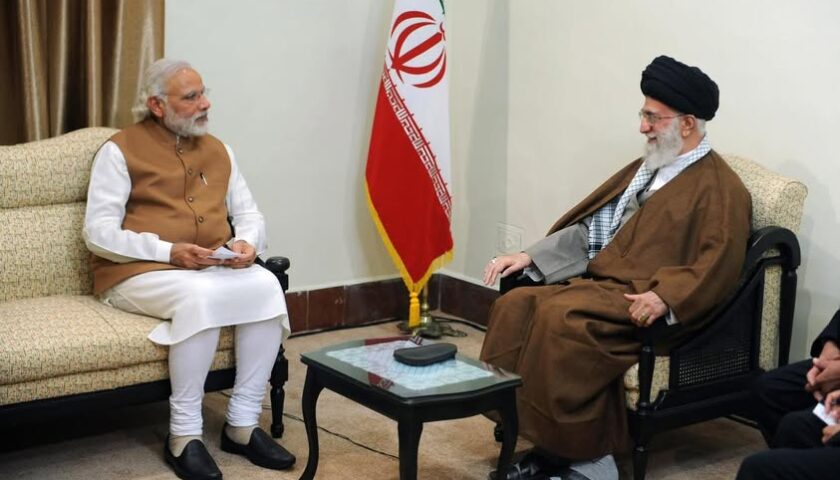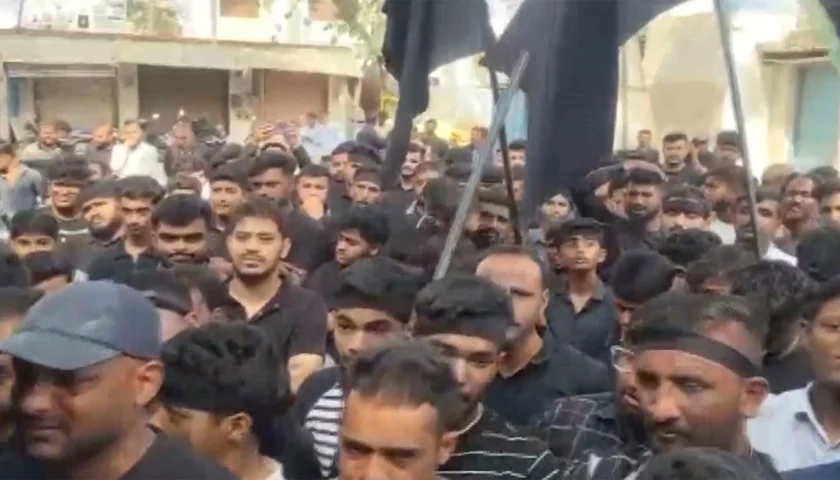Mehbooba Mufti has filed a Public Interest Litigation (PIL) in the Jammu & Kashmir High Court seeking the repatriation of undertrial prisoners from jails outside the Union Territory back to J&K. She argues this prolonged detention violates their constitutional rights.
By: Javid Amin | 30 October 2025
In a significant legal move that touches at the intersection of criminal justice, human rights, and institutional reform in the Union Territory of Jammu & Kashmir (J&K), former Chief Minister and opposition leader Mehbooba Mufti has filed a Public Interest Litigation (PIL) in the Jammu & Kashmir High Court. Her petition seeks the repatriation of under-trial prisoners from jails located outside the UT back to local prisons within J&K, arguing that extended detention in distant facilities infringes upon their statutory and constitutional rights.
The move draws attention not only to the logistics and fairness of detention practices but also to deeper governance and rights-based questions about how the justice system functions in a region marked by decades of conflict, administrative restructuring and security oversight. This article delves into the details of the petition, the legal and constitutional grounds invoked, the broader context in J&K, and the implications for justice, institutions and society.
Who Is Behind the PIL and What Are the Demands?
The Petitioner: Mehbooba Mufti
Mehbooba Mufti is the President of the Peoples Democratic Party (PDP) and a former Chief Minister of J&K. With a long political career in the region, her filing of this PIL reflects not only a political posture but also a response to petitions from families of detainees who claim hardship and injustice. According to her plea, she has been approached by numerous family members of under-trial prisoners seeking her intervention.
Core Demands of the Petition
The PIL outlines several key demands:
-
Transfer (or “repatriation”) of all under-trial prisoners from J&K currently lodged in prisons outside the Union Territory, unless there are case-specific, written reasons justifying their stay outside.
-
The setting up of judicial oversight and regular reviews (for example, quarterly reviews) for those exceptional cases where prisoners remain outside J&K.
-
A protocol ensuring guaranteed access: weekly in-person family visits, unfettered lawyer-client meetings subject to reasonable regulations, and no denial on account of escort or cost pretexts.
-
Travel reimbursement and accommodation support for one family member per month for each under-trial prisoner until the repatriation is completed.
-
Priority physical production of repatriated under-trials in court, fixed outer timelines for evidence recording, preventing adjournments caused by custodial logistics.
Legal Mechanisms Invoked
The petition invokes:
-
Article 14 of the Constitution (Right to Equality) – arguing that under-trial prisoners from J&K are being discriminated against when compared to those held within the UT.
-
Article 21 of the Constitution (Right to Life and Personal Liberty) – contending that distant incarceration deprives the prisoners of meaningful access to counsel, family contact, and timely trials, thus violating their fundamental rights.
-
Article 226 – The petition is filed under this provision (writ jurisdiction) of the Constitution, seeking the High Court’s intervention by way of a writ of mandamus.
Why This Matter Has Arisen Now
The August 5, 2019 Re-organisation and Its Aftermath
The petition explicitly references the abrogation of Article 370 on August 5, 2019, and the subsequent conversion of J&K from a state into a Union Territory. It argues that post this re-organisation, a large number of residents of J&K facing investigations or trials have been lodged in jails outside the UT, even though their FIRs and trials are based in J&K.
Scale and Impact of Out–of-Region Detention
The petition highlights several logistical and rights-based hardships:
-
Families of the under-trial prisoners face “crippling travel costs”, long distances and logistical burdens just to visit their loved ones.
-
Lawyers and clients face difficulties: many cases involve “voluminous evidence and large witness lists”, requiring sustained private consultation — something that becomes extremely hard when the detainee is lodged hundreds of kilometres away.
-
The petition argues that the current practice effectively turns detention into a “punishment by process”, especially when under-trials are kept far away while their trials are still pending.
Institutional and Human Rights Concerns
The petition invokes national and international standards — for example the Model Prison Manual — to argue that under-trials must be treated differently from convicts, with greater access to legal counsel, family visits and humane conditions. It argues that the current out-of-region lodging undermines these standards.
Given the broader conflict-history and security governance in J&K — where detention, preventive custody and under-trial detention have been contentious issues — the petition touches on both governance reform and rights protection.
Key Issues Raised by the Petition
Equal Access and Non-Discrimination (Article 14)
The argument is that under-trial prisoners from J&K are being treated differently — and worse — than those lodged locally in terms of access to court, family, counsel and trial logistics. This differential treatment raises a question of equality before law or equal protection of law.
Right to Life and Personal Liberty (Article 21)
Keeping an under-trial prisoner far from home can:
-
Severely limit family contact, which is part of the dignity dimension of Article 21.
-
Impair the right to a meaningful defence, because lawyer-client meetings, evidence review, consultation become extremely difficult.
-
Delay the trial, or impose logistic burdens that effectively punish an under-trial prior to conviction. The petition calls this “punishment by distance”.
The Presumption of Innocence
The petition stresses that under-trial prisoners are not yet convicted. Holding them far away, in conditions that closely resemble punishment for convicts (extended distances, logistical constraints) undermines the principle of presumption of innocence.
Access to Counsel, Family, Court
The petition draws attention to practical obstacles: travel costs, long distances, multiple jurisdictions, delayed production in court, limited lawyer-client contact — all of which hamper the fairness of trial. This is particularly stark in complex cases with big evidence and large witness lists.
Oversight, Transparency and Institutional Reform
Beyond the immediate transfers, the petition seeks structural reform:
-
Quarterly judicial review of exceptions where prisoners remain outside the UT.
-
Oversight committee (retired judge + member of the State Legal Services Authority) to audit logs of lawyer-client meetings, family visits, production orders, etc.
-
Protocols for family and counsel access.
-
Travel/accommodation compensation for families until repatriation.
Implications: What Does This Mean for J&K and Beyond?
For Justice Administration & Prison Policy
If the High Court grants the relief, it could lead to:
-
A large-scale transfer of under-trial prisoners from out-of-region jails back into J&K, which will require coordination between central and UT authorities, prison administration, home departments and judiciary.
-
A review of the reasons why prisoners were kept out-of-region in the first place — whether for security, lack of space, or other administrative reasons.
-
Implementation of oversight mechanisms and rights-protective protocols in prison management and under-trial handling.
-
Potentially, a shift in how under-trial detention is treated in conflict-affected regions – emphasising proximity, fairness and access.
For Human Rights and Institutional Credibility
The move could bolster the credibility of public institutions in J&K by signaling that the state cares about fairness, due process and humane treatment — not just security. Conversely, if implementation is weak or delayed, criticism could deepen of opaque detention practices and institutional neglect.
For Families, Defendants and Legal Professionals
Practical benefits could accrue: reduced travel burden for families, improved lawyer-client interface, better case preparation, faster hearings, improved morale of under-trial prisoners. It may also raise awareness among legal professionals about the burdens faced by clients in distant custody, possibly leading to more nuanced defence strategies.
For Political and Social Narrative
For Mehbooba Mufti and her party, this petition reinforces a narrative of rights advocacy and institutional reform, which can have electoral and social resonance in a region where governance, rights and security are deeply intertwined. It may also prompt other parties or civil-society actors to take up similar reformist positions.
For Other Regions & Precedents
While this case is specific to J&K, the principles invoked—rights of under-trials, fairness of detention, accessibility to counsel and family—are applicable broadly. A favourable judgment might serve as precedent or impetus for reform in other regions where under-trial prisoners are kept far from home, especially in conflict-states or Union Territories.
Potential Challenges & Critiques
Administrative & Logistical Hurdles
-
Transferring large numbers of under-trial prisoners back to J&K will require capacity — in jails, logistics, security, legal coordination.
-
Some prisoners may be lodged outside J&K for legitimate reasons (security concerns, inter-state agreements, prison overcrowding). The petition anticipates this and allows for case-specific written reasons and quarterly review.
-
Ensuring reliable and timely visa, transport, law-enforcement coordination may be complex.
Security Concerns
In a region like J&K, authorities may argue that certain detainees require off-site lodgement for security reasons, risk of local radicalisation, witness protection, or cross-border infiltration. Any blanket transfer may conflict with this perspective. The petition acknowledges exceptions but demands transparency and review.
Process, Fairness and Non-Interference
Opponents may argue that frequent transfers might disrupt trials, custody chain, exhibits, witness availability. Similarly, oversight committees and frequent reviews may burden prison/justice administration. Balancing oversight with operational feasibility will be key.
Risk of Tokenism
If the High Court orders transfers but the administration fails to implement or delays them indefinitely, this could create disillusionment. The real test will be in effective implementation, monitoring and genuine rights-based change, not just legal wins.
Broader Structural Issues
While the transfer is important, critics may argue that it addresses only one dimension of the problem. Other systemic issues — overcrowding, under-trial backlog, delays in trial, lack of legal aid, prison conditions, preventive detention laws (e.g., PSA) — remain. Without broader reform, the impact may be muted.
What to Watch For Next
-
Court Dates & Interim Orders: Monitor when the High Court schedules the matter and whether it issues interim relief (e.g., stay on further transfers outside J&K, or immediate transfers pending inquiry).
-
Response from State & Central Government: What do the respondents (Union of India, J&K Home Department, DG Prisons etc) say? Will they file a detailed affidavit explaining the reasons for out-of-UT lodgement and propose a timeline?
-
Criteria for Exceptions: The petition demands that for exceptional cases, written reasons showing unavoidable, compelling necessity be placed on record and subject to review. How will this be defined and operationalised?
-
Oversight Mechanisms: Will the Court order the creation of the two-member oversight/grievance committee? If yes, who will be appointed, how will they function, and will their reports be made public?
-
Family Reimbursement & Lawyer-Client Access Protocols: Will the Court direct travel/accommodation reimbursement for families? Will the protocol for weekly family visits, lawyer-client meetings be enacted and enforced?
-
Implementation Metrics: Number of prisoners transferred, time taken for transfer, improvement (if any) in court production timelines, lawyer-client meetings, family visit logs.
-
Broader Prison Reform: Whether this case triggers a broader policy review in J&K regarding under-trial detention practices, locational fairness, capacity in jails, prisoner rights and backlog reduction.
-
Media and Civil Society Monitoring: How NGOs, lawyers, prison reform activists respond and whether they monitor and publicise compliance or non-compliance.
Broader Reflections: Why This Matters
Justice is More Than Conviction
Under-trial detention is one of the most sensitive areas of criminal justice. The longer someone is held awaiting trial — especially far from home — the greater the risk of rights erosion, stigma, backlog and inadequate defence. In a region like J&K, already burdened with conflict-legacies, this issue takes on amplified importance.
Geography, Distance and Justice
Often the mechanics of justice assume proximity: courthouse nearby, prison within manageable distance, lawyer visits frequent, family contact routine. When these assumptions break — because of geography, security, or policy — then justice becomes logistically and socially tough. The petition emphasises that distance itself can become a punitive aspect.
Intersection of Security, Governance and Rights
J&K has a unique governance and security dynamic. While security concerns are paramount, they must be balanced with rule of law, institutional fairness and human rights. This case illustrates that tension: the need to hold detainees, sometimes far away for security/policy reasons, versus the obligation to ensure fairness, access, constitutionality.
Symbolic and Practical Impact
Symbolically, the petition underscores that the system must recognise the humanity of under-trial prisoners, not treat them simply as numbers. Practically, if implemented, it may improve detainee conditions, reduce travel burdens for families, expedite trials, and strengthen faith in public institutions.
Risk of Narrow Reforms
It is important to caution that while this petition is crucial, it cannot be a silver bullet. Without parallel reforms — e.g., reducing under-trial backlog, improving legal aid, upgrading jail infrastructure, addressing cause of delays in trials, ensuring meaningful rehabilitation — the benefits may be partial. The focus must remain holistic.
Bottom-Line
The PIL filed by Mehbooba Mufti in the Jammu & Kashmir High Court presents a significant juncture in the region’s justice and governance discourse. By focusing on the repatriation of under-trial prisoners to their home territory, and by detailing the burdens of distant detention on families, legal access and fairness, the petition shines a spotlight on an often-neglected dimension of criminal justice in conflict-affected regions.
If successful and implemented effectively, it could herald a shift in how J&K and perhaps other similarly situated regions approach under-trial detention — emphasising proximity, rights, institutional oversight and humane treatment. The real test, however, will lie in the follow-through: the orders the Court issues, the government’s responsiveness, and the monitoring of compliance.
For the families of detainees, the legal professionals, civil society activists, and the institutional machinery of the UT, this is an opportunity to move from legal theory to lived justice. For governance in J&K, it is a test of whether justice can be both firm and fair, whether security can be paired with rights, and whether the institutions can be re-oriented to reflect not just state power but citizen dignity.
Let us watch how this case unfolds — and whether it becomes a catalyst for broader reform, or remains a single gesture in a challenging landscape.




